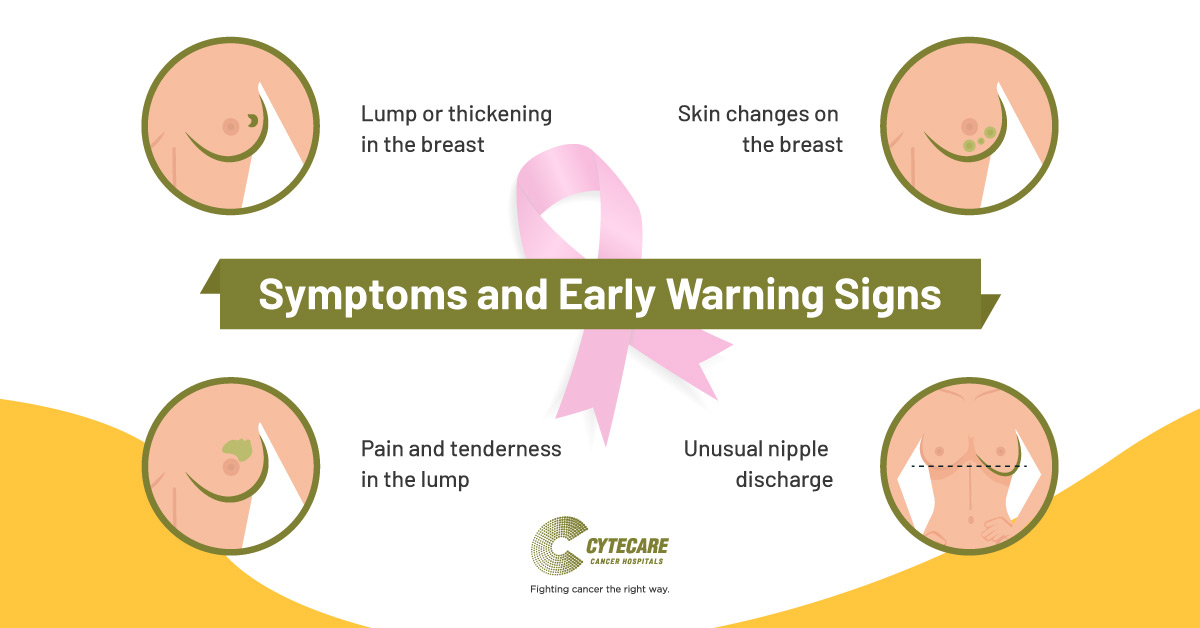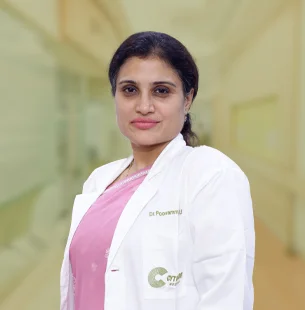About Breast cancer
Breast cancer refers to cancers occurring in the breast tissues, developed due to uncontrolled division of different cells of the breast. Bangalore, sadly, is known to be the breast cancer capital of India. Being diagnosed with breast cancer can be quite devastating for a woman. For this reason, we have invested ourselves in building a dedicated women's oncology setup that manages all cancers related to women. Studies show that early breast cancer detection and treatment have better outcomes and prognosis, which is possible only if there is good awareness among women about breast cancer symptoms and evaluation methods. With organ site specialists who have extensive experience in breast oncology and imaging, Cytecare provides accurate breast cancer diagnosis for better clinical judgment regarding therapeutic choices.
Cytecare provides comprehensive breast cancer treatment services, including minimally invasive procedures and surgical techniques designed for minimal postoperative discomfort and issues such as lymphedema. The holistic evaluation and treatment plan of breast cancer includes breast cancer risk assessment and screening, breast imaging, breast cancer surgery (lumpectomy, mastectomy), breast reconstruction , and support services for women living with breast cancer.
Breast Cancer Screening & Prevention
We have an ongoing commitment towards breast cancer prevention and breast cancer early detection. Early detection of breast cancer allows the best outcome, both in terms of survival and quality of life. Hence, we provide comprehensive and risk-stratified, individualized screening for breast cancer, in addition to detailed risk assessment and genetic screening for women with a family history of breast cancer.
With state-of-the-art technology and the latest digital breast tomosynthesis , our team of cancer care specialists and technicians minimize the discomfort during screening procedures of breast cancer. Our oncoplastic surgeons and radiologists are specially trained to read and interpret mammography, ensuring accurate reading, diagnosis, and lower patient recall.
We provide the following breast cancer screening services
- Breast Cancer Risk Assessment
- Clinical Breast Examination
- Digital Mammography (2D)
- Digital Breast Tomosynthesis -DBT (3D mammography)
- Breast Ultrasound
- Breast MRI
- Image guided Biopsy (FNAC)
- Genetic counselling for patients with history of familial/hereditary breast cancer
- Genetic Screening /Biomarker testing (BRCA1, 2, Hormone assay)
Cytecare Breast Oncology team highly recommends that women over the age of 40 have an annual breast examination.
Breast Cancer Screening & Prevention
We have an ongoing commitment towards breast cancer prevention and breast cancer early detection. Early detection of breast cancer allows the best outcome, both in terms of survival and quality of life. Hence, we provide comprehensive and risk-stratified, individualized screening for breast cancer, in addition to detailed risk assessment and genetic screening for women with a family history of breast cancer.
With state-of-the-art technology and the latest digital breast tomosynthesis , our team of cancer care specialists and technicians minimize the discomfort during screening procedures of breast cancer. Our oncoplastic surgeons and radiologists are specially trained to read and interpret mammography, ensuring accurate reading, diagnosis, and lower patient recall.
We provide the following breast cancer screening services
- Breast Cancer Risk Assessment
- Clinical Breast Examination
- Digital Mammography (2D)
- Digital Breast Tomosynthesis -DBT (3D mammography)
- Breast Ultrasound
- Breast MRI
- Image guided Biopsy (FNAC)
- Genetic counselling for patients with history of familial/hereditary breast cancer
- Genetic Screening /Biomarker testing (BRCA1, 2, Hormone assay)
Cytecare Breast Oncology team highly recommends that women over the age of 40 have an annual breast examination.
Breast Cancer Diagnosis
While breast cancer may be asymptomatic in its early stages, one must always be aware of the breast cancer symptoms to recognise them as and when they become visible. One must consult a breast cancer specialist if any of the symptoms are observed. Usually, a combination of the below tests will be conducted for the best results:
- Physical examination of the breast: The doctor will do a thorough physical examination of the breast and armpits to check for hardened tissues, lumps, enlarged lymph nodes, and altered shape, in addition to assessing the size and colour of the breasts and armpits.
- In case any sign of abnormality is found, such as a lump, the following tests are prescribed for a clear idea of its nature. If a patient suspects a risk and wishes to get screened, doctors are likely to recommend some imaging tests. The following breast cancer tests are required to detect abnormalities that can go undetected by touch and observation:
- Breast Imaging
- Ultrasonography- Breast
- Digital Breast Tomosynthesis -DBT (3D mammography)
- Breast MRI: An MRI is used to produce detailed pictures of the inside of the breast. A breast MRI is not regularly used for breast cancer screening and may be recommended for women with a higher risk of breast cancer. While a mammogram is the standard method for diagnosing early-stage breast cancer, an MRI may be done in certain instances to complement it.
- Digital Mammography (2D)
- Biopsy
- Fine needle aspiration (FNAC)
- Stereo/core biopsy
- Genetic tests for BRCA1, BRCA2, Her2
- Hormone receptor test Progesterone and Estrogen Receptors
- Breast Imaging
Breast Cancer Treatment
Breast Cancer Surgery is considered to play a curative role in most cancers including breast cancer. Complete tumour resection is the main goal of breast cancer surgery. At Cytecare, we have dedicated oncoplastic breast surgeons to perform breast surgery. We recommend that patients always choose a specialist who specializes in breast cancer surgery. At Cytecare, we provide state-of-the-art surgery with exceptional post-surgical care, to minimise lymphedema, nausea, and vomiting. We offer excellent wound care so our cancer patients, who have had lumpectomy and mastectomy, are able to recover faster owing to the lower risk of infection.
We provide a range of surgical services for breast cancer that includes:
- Axillary node dissection
- Sentinel node biopsy
- Lumpectomy/breast conservation
- Mastectomy
- Total simple mastectomy
- Modified radical mastectomy
- Skin sparing mastectomy
- Nipple sparing mastectomy
- Nipple and areola sparing mastectomy
- Scar sparing mastectomy
- Oncoplastic surgery
- Simultaneous reconstruction
- Staged reconstruction
- Preventive/prophylactic mastectomy
- Radiation Oncology
- Medical Oncology
- Palliative Care







